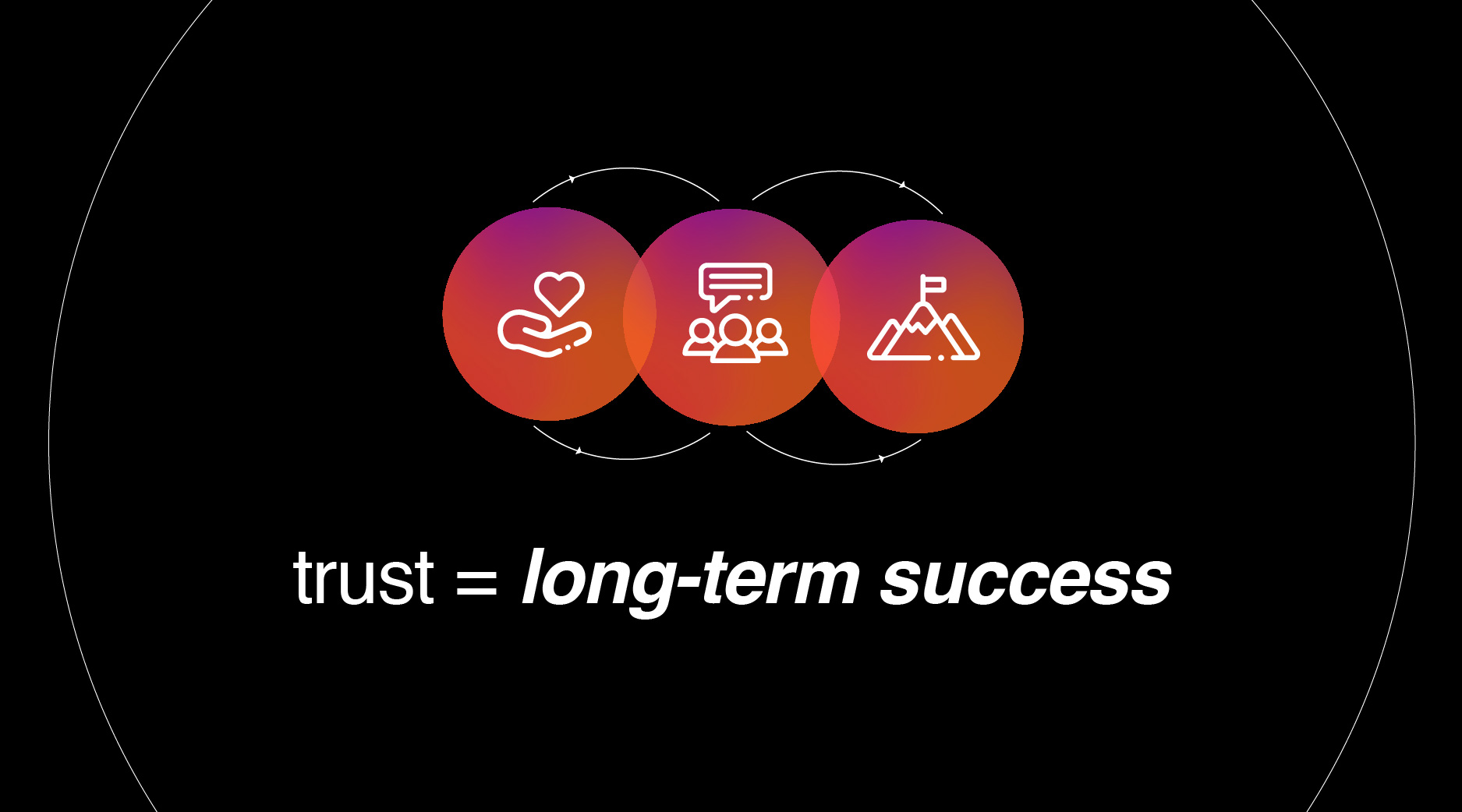(Because nobody wants to work with flaky people.)
Let’s be real, good business relationships are kind of like good friendships. You want someone who’s honest, shows up when it matters and has your back when things get tough. That magic word that keeps it all together? Trust.
At Simantel, we believe trust isn’t just a “feel-good” buzzword. It’s the real deal. It’s what turns one-off assignments into long-term partnerships. Projects run smoother, decisions come easier and everyone actually wants to be on the same Teams call. And guess what? We have the research to back up these beliefs.
In our inaugural research report, Problem-solving Through Partnerships, we surveyed over 250 marketers to find out what really matters in long-term partnerships. The results? Trust rose to the top of the list. People want to work with partners that are open, honest and in it for the long haul.
Whether you’re leading a team or connecting with clients, trust is the foundation of a lasting relationship. So how do you build the kind of trust that leads to long-term partnerships? Here are three strategies we’ve learned (sometimes the hard way) that just might work for you, too.
1. Be Transparent (Even When It’s Awkward)
If you want trust, you’ve got to talk straight. No fluff. No jargon. No hiding behind buzzwords. Just real, honest conversations that let people know you mean what you say.
According to our research, 70% of marketers say openness and honesty are the top traits they look for in a trusted partner. This data says a lot. Trust isn’t something you build by being slick. It’s something you earn by being real.
So, what does transparency actually look like?
- Telling the truth even when it’s uncomfortable.
- Admitting when something’s not working instead of pretending everything’s fine.
- Sharing realistic timelines (not just the ones you wish you could hit).
- Explaining why decisions are being made; not just handing them down and hoping for the best.
Being transparent doesn’t mean you have to have all the answers. (Spoiler: no one does.) It just means you’re not afraid to have the hard conversations. And if you’re the kind of partner who’s not afraid to say, “Here’s where we are and here’s how we’re going to work through it together,” people notice. That’s the kind of straight talk that earns long-term loyalty.
Trust in Practice: You hit a technology snag halfway through a digital rollout. Instead of sugarcoating it to your partner, lay it all out, own the issue and collaborate on a solution. The launch might get delayed by a week, but the relationship? Stronger than ever.
2. Be a Team When Stuff Hits the Fan
No one wants to feel like they’re dealing with problems alone, especially when the stakes are high and the pressure’s on. When things go sideways (because, let’s be honest, they will), trust is built through action, showing up, pitching in and figuring it out together.
According to our research, 80% of marketers say strong communication and listening skills are must-haves in a trusted partner. That means it’s not just about being heard, it’s about being understood. Because a good partner knows that in tough moments it doesn’t mean swooping in with a cape and calling yourself the hero. It means grabbing a seat at the table (or the Teams call), asking the right questions and getting into the mess. Brainstorm together. Troubleshoot together. Hop on a late-night call. Send the “we got this” meme at 10 p.m. when the file won’t export for the third time.
Those moments — the ones where you show up not because you have to, but because you want to — are what turn a project partner into a real, trusted ally.
Trust in Practice: During a last-minute campaign pivot, bring together everyone involved (creatives, data analysts and key stakeholders) to rework strategy in real time. It won’t be perfect but your partners will feel heard, supported and part of the process. That’s trust in action.
3. Think Long-Term, Not Just Quick Wins
It’s easy to chase the shiny stuff; the quick wins, the impressive short-term results, the one-off project that gets a standing ovation in the room. And hey, those wins matter. But if that’s all a partnership is built on? It won’t last.
Real trust takes time. It builds slowly, layer by layer, over shared experiences and consistent follow-through. Our research backs that up: 80% of decision-makers say they feel more confident in partners they’ve worked with over multiple years. That kind of confidence doesn’t come from one great campaign. It comes from a track record of partners who keep showing up, delivering value and adapting as the business grows.
Long-term partners aren’t just asking, “What do you need today?” They’re asking the bigger question: “Where are you going and how can we grow with you?” They’re thinking beyond the next deadline. They’re helping you spot blind spots, plan for the future and evolve when the market shifts (because it will).
And when a partner is just as invested in your long-term success as you are? That’s when you stop thinking of them as a vendor… and start thinking of them as part of your team.
Trust in Practice: We’ve had partners come to us for a single campaign. Our relationship didn’t end there. We’re now helping them shape big-picture strategy, evolve their brand and connect with their audience in new ways, all because the relationship was built on trust from day one.
Conclusion: So, How Do You Build Trust?
Here’s the cheat sheet:
- Be honest and open (even if it’s uncomfortable)
- Solve stuff together (teamwork makes the dream work)
- Play the long game (trust takes time, and it’s worth it)
Want the full scoop? Download our latest research report: Problem-solving Through Partnerships. It’s full of real data, actionable takeaways and even more insights on what makes partnership and trust stick.
At Simantel, we’re all about building partnerships that last. So, if you’re looking for a team who’s in it with you (not just for you) let’s talk.





